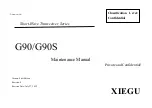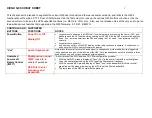
All models have provisions for add on modules or "options" as Philips calls them.
Selcall Type 1
Selcall Type 2
CTCSS Encode
CTCSS Decode
CTCSS Encode / Decode
CTCSS Encode / Decode and Reverse tone burst
RTB ( Reverse tone burst )
Battery Backup ( CPU current data backup, long duration )
Cap Backup ( CPU current data backup, short duration )
Extended B/W for MK2 only
TXCO Temperature controlled crystal oscillator Crystal Heater
7: Just a few notes, hints, tips and tricks which don't fit anywhere else:
Before swinging back the PC boards, and especially before removing the EPROM, ensure you disconnect the
DC supply from the unit. Remember, although the "PWR" switch may be off, there is still DC supplied to the
EPROM circuitry and many parts of the boards. On swinging back the boards with DC applied, it is easy to short
the 13.8V and 5V supplies. And obviously, removing and replacing EPROMS with power applied, is NOT a good
idea!
When reassembling the transceiver unit after disassembly, first spray the panel screws with WD-40, then replace
all screws lightly in their respective holes. Then, while maintaining a little pressure on the screw, unscrew slightly
until a click is felt, then tighten most of the way. Repeat for all screws, then go around and finally tighten them all.
This avoids "second-starting" (cross-threading), which is otherwise easily achieved.
Miscellaneous intermittent problems caused by dry Joints. As mentioned previously, these units have seen
service with many commercial operators. Presumably, servicing has been carried out by technicians with various
degrees of skill, and possibly in a hurry. As a result of these factors, some of the units have been found to have
intermittent problems of all kinds. It has been suggested to me on a number of occasions that all solder joints on
each board should be re-soldered!
Be careful with this, however, as some of the pads are very close together, and it is possible to melt the low-
temp solder inside the front-end and VCO blocks, causing more problems.
Given the sheer number of joints, and in some cases the extreme proximity of some of these joints (eg, IC
connectors) this is not a particularly easy task, but close examination of the circuit boards is certainly warranted.
Philips FM92E Conversion to 6 Meters: Version 3.9 Page
8
Summary of Contents for FM92E
Page 19: ...Synthesiser Board Philips FM92E Conversion to 6 Meters Version 3 9 Page 19 ...
Page 26: ...Receiver Board Philips FM92E Conversion to 6 Meters Version 3 9 Page 26 ...
Page 50: ...FM91E PA Board above view Philips FM92E Conversion to 6 Meters Version 3 9 Page 50 ...
Page 52: ...Philips FM92E Conversion to 6 Meters Version 3 9 Page 52 ...
Page 54: ...Philips FM92E Conversion to 6 Meters Version 3 9 Page 54 ...
Page 55: ...Philips FM92E Conversion to 6 Meters Version 3 9 Page 55 ...
Page 79: ...40 6 Meter Antenna Philips FM92E Conversion to 6 Meters Version 3 9 Page 79 ...
Page 83: ...42 Philips FM91 Schematic Diagrams Philips FM92E Conversion to 6 Meters Version 3 9 Page 83 ...









































